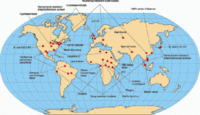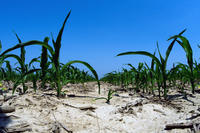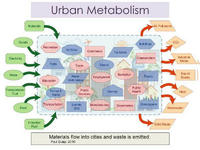-
Surveillance system identifies, tracks emerging infectious diseases
Researchers have developed a method to identify the cause of infectious disease outbreaks based on online reports about the symptoms, the season, and the ratio of cases to fatalities. Using data from the Internet outbreak reporting system ProMED-mail, the researchers applied this method to more than 100 outbreaks of encephalitis in South Asia, recently identified as an emerging infectious disease “hotspot.”
-
-
Old, faulty bores jeopardize Australia's water
Australian homes, towns, cities, farmers, and miners will rely increasingly on underground water as the country’s population grows, surface water supplies dwindle, and as droughts multiply under a warming climate. Trouble is, the authorities in charge do not have a clear idea exactly how much groundwater there is, how rapidly it is recharged — or how quickly it is being depleted. What is known is based on data largely supplied by 23,000 monitoring bores spread across the continent — more than two thirds of which are now falling into disrepair.
-
-
DNA sequencing a serious risk to privacy
The growing ease of DNA sequencing has led to enormous advancements in the scientific field. Through extensive networked databases, researchers can access genetic information to gain valuable knowledge about causative and preventative factors for disease, and identify new targets for future treatments. The wider availability of such information, however, also has a significant downside — the risk of revealing personal information. New study finds that new policies are needed to safeguard participants’ identity in genetic studies.
-
-
Massachusetts moves against unscrupulous compounding pharmas
State regulators in Massachusetts have shut down or cited thirty-two of the state’s forty compounding pharmacies as a result of a nationwide fungal meningitis outbreak. The outbreak killed forty-five people and sickened 696, who required hospitalization.
-
-
Climate change threatens public health, safety, economy along U.S. coasts
A new technical study from the U.S. National Oceanic and Atmospheric Agency (NOAA) and the U.S. Geological Survey (USGS) reports that the effects of climate change will continue to threaten the health and vitality of U.S. coastal communities’ social, economic, and natural systems. All U.S. coasts are highly vulnerable to the effects of climate change such as sea-level rise, erosion, storms, and flooding, especially in the more populated low-lying parts of the U.S. coast along the Gulf of Mexico, Mid-Atlantic, northern Alaska, Hawaii, and island territories. The report says that the financial risks associated with both private and public hazard insurance are expected to increase dramatically.
-
-
Improving mapping of infectious disease

Since the mid-nineteenth century, maps have helped elucidate the deadly mysteries of diseases like cholera and yellow fever. Yet today’s global mapping of infectious diseases is considerably unreliable and may do little to inform the control of potential outbreaks, according to a new systematic mapping review of all clinically important infectious diseases known to humans. The study recommends new tools to improve global mapping of infectious disease.
-
-
Arizona may require hospitals to report undocumented immigrants seeking care
A bill before the Arizona legislature aims to track how many undocumented immigrants are receiving free medical care at hospitals in Arizona. The bill would require hospitals to confirm a person’s legal presence in the country if the individual seeking care does not have insurance. If the staff thinks the patient is here illegally, they must notify authorities.
-
-
Promising substance for better cyanide antidote for terrorist attacks
In an advance toward closing a major gap in defenses against terrorist attacks and other mass casualty events, scientists are reporting discovery of a promising substance that could be the basis for development of a better antidote for cyanide poisoning.
-
-
The historical probability of drought

Droughts can severely limit crop growth, causing yearly losses of around $8 billion in the United States. It may be possible, however, to minimize those losses if farmers can synchronize the growth of crops with periods of time when drought is less likely to occur. Researchers are working to create a reliable “calendar” of seasonal drought patterns that could help farmers optimize crop production by avoiding days prone to drought.
-
-
Americans’ health worst among high-income countries
On average, Americans die sooner and experience higher rates of disease and injury than people in other high-income countries. This health disadvantage exists even though the United States spends more per capita on health care than any other nation. A new study offers a comprehensive comparison of the United States with sixteen peer nations — affluent democracies that include Australia, Canada, Japan, and many Western European countries. Among these countries, the United States is at or near the bottom in the nine key areas of health to study examined.
-
-
Improving cities by using the notion of “urban metabolism”

As is the case with organisms, cities need energy, water, and nutrients, and they need to dispose of wastes and byproducts in ways which are viable and sustainable over the long run. This concept of “urban metabolism” is a model for looking systematically at the resources that flow into cities and the wastes and emissions that flow out from them in order better to understand the environmental impacts of cities and to highlight opportunities for efficiencies, improvements, and transformation.
-
-
Better predictions of Asian summer monsoons, tropical storms

The amount of rainfall and number of tropical storms during the summer monsoon season greatly impact the agriculture, economy, and people in Asia. Though meteorologists and climate scientists have worked for years to develop helpful prediction systems, seasonal predictions of these two types of weather phenomena are still poor. Scientists have now made a promising breakthrough for predicting in spring both the summer monsoon rainfall over East Asia and the number of tropical storms affecting East Asian coastal areas.
-
-
South African study highlights African fuelwood crisis
Researchers have found that at current consumption levels in the communal areas of Lowveld, South Africa, reserves of fuelwood could be totally exhausted within thirteen years. The consequences are significant, with around half of the 2.4 million rural households in the country using wood as their primary fuel source, burning between four and seven million tons per year.
-
-
Fracking generates less wastewater per unit of gas, but more overall
Hydraulically fractured natural gas wells are producing less wastewater per unit of gas recovered than conventional wells would. The scale of fracking operations in the Marcellus shale region – which stretches from New York to Virginia and accounts for about 10 percent of all natural gas produced in the United States today — is so vast, however, that the wastewater it produces threatens to overwhelm the region’s wastewater disposal capacity.
-
-
Large amounts of antibacterial agent used in soaps found in freshwater lakes
When people wash their hands with antibacterial soap, most do not think about where the chemicals contained in that soap end up. A new study determined that the common antibacterial agent, called triclosan, used in soaps and many other products, is found in increasing amounts in several Minnesota freshwater lakes.
-
More headlines
The long view
We Ran the C.D.C.: Kennedy Is Endangering Every American’s Health
Nine former leaders of the Centers for Disease Control and Prevention (CDC), who served as directors or acting directors under Republican and Democratic administrations, serving under presidents from Jimmy Carter to Donald Trrump, argue that HHS Secretary Roert F. Kennedy Jr. poses a clear and present danger to the health of Americans. He has placed anti-vaxxers and conspiracy theorists at top HHS positions, and he appears to be guided by a hostility to science and a belief in bizarre, unscientific approaches to public health.
